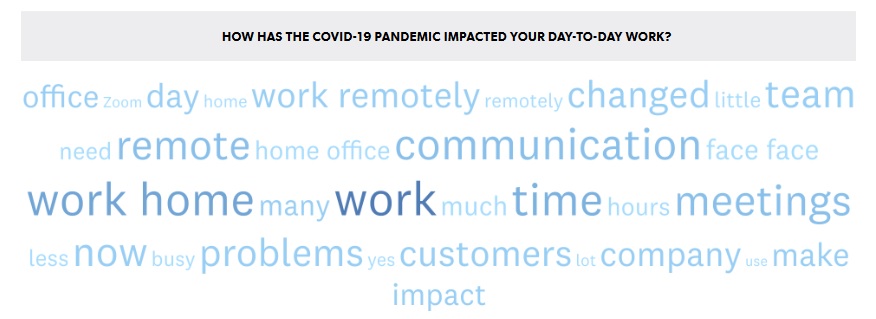MacStadium announced that it has obtained Cloud Security Alliance (CSA) Security, Trust & Assurance Registry (STAR) Level 1, meaning that MacStadium has publicly documented its compliance with CSA’s Cloud Controls Matrix (CCM), and that it joined the Cloud Security Alliance (CSA), the world’s leading organization dedicated to defining and raising awareness of best practices to help ensure a secure cloud computing environment.
The COVID-19 pandemic has been a disruptive event for development teams and companies alike, unsurprisingly, according to a recent survey of developers across the world by JRebel by Perforce.
Developers were asked to share the impact COVID-19 has had on themselves, their teams, and their companies. Respondents report working longer hours from home, struggling to maintain good work habits, and eating more comfort food to cope.
On a more positive note, many respondents are spending more time with families or in nature, and reporting even simple things such as noise-cancellation headphones making home-based working easier.

Impact on Hours
91% of developers report that they are working from home (and as early adopters of new ways of working, many developers have already been successfully working from home for years.)
While only 17% reported a drastic impact on their work since the pandemic (with over half of respondents saying that the impact had been moderate), 58% said that they've experienced an increase in hours per week.
While the most-reported increase was between zero and three hours, over 19% reported an increase of over 6 hours per week. It also means that roughly 2% of respondents reported a 6+ hour increase but did not consider that to be a drastic impact on their work.
For developers already putting in long hours pre-COVID, that marks a substantial increase, even a small percentage increase has big implications for busy teams. That said, anecdotal evidence from some survey respondents found that some of the extra time goes into checking "just one more email."
Nearly 56% of companies decreased or froze hiring, 33% decreased contractors
The survey found nearly 56% of companies decreased or stopped hiring during the COVID-19 pandemic, and 33% reported a decrease in the number of staffed contractors. However, that the figures are not higher is a positive surprise: indeed, that over a third report no change in hiring patterns, and almost 60% no changes in contracting.
Key Takeaways
That remote work will remain prominent is no longer news, with more companies expected to embrace decentralized autonomous and fully remote teams for the longer-term.
Reduced overhead and increased pace of innovation will continue to be important points of change for organizations, and the pandemic has been the catalyst for new working models.
Virtual communications is fast becoming the new-norm, together with a shift away from permanent office space to "hoteling" options.
For instance, development teams have been trending smaller for some time now, but COVID-19 has clearly shown the importance of having small, agile teams.
Also, widespread access to new cloud, open source, VR, and AI technologies will mean smaller teams can compete side by side with much larger organizations.
2020 has been tough, with organizations of all kinds having to accelerate digital transformation and rapidly reinvent how they operate. Getting the foundations in place now for a more flexible modern workplace puts the IT community in good shape to adapt and deal with pandemics and other unforeseen challenges.
Industry News
The Cloud Native Computing Foundation® (CNCF®) released the two-day schedule for CloudNativeSecurityCon North America 2024 happening in Seattle, Washington from June 26-27, 2024.
Sumo Logic announced new AI and security analytics capabilities that allow security and development teams to align around a single source of truth and collect and act on data insights more quickly.
Red Hat is announcing an optional additional 12-month EUS term for OpenShift 4.14 and subsequent even-numbered Red Hat OpenShift releases in the 4.x series.
HAProxy Technologies announced the launch of HAProxy Enterprise 2.9.
ArmorCode announced the general availability of AI Correlation in the ArmorCode ASPM Platform.
Octopus Deploy launched new features to help simplify Kubernetes CD at scale for enterprises.
Cequence announced multiple ML-powered advancements to its Unified API Protection (UAP) platform.
Oracle announced plans for Oracle Code Assist, an AI code companion, to help developers boost velocity and enhance code consistency.
New Relic launched Secure Developer Alliance.
Dynatrace is enhancing its platform with new Kubernetes Security Posture Management (KSPM) capabilities for observability-driven security, configuration, and compliance monitoring.
Red Hat announced advances in Red Hat OpenShift AI, an open hybrid artificial intelligence (AI) and machine learning (ML) platform built on Red Hat OpenShift that enables enterprises to create and deliver AI-enabled applications at scale across hybrid clouds.
ServiceNow is introducing new capabilities to help teams create apps and scale workflows faster on the Now Platform and to boost developer and admin productivity.
Red Hat and Oracle announced the general availability of Red Hat OpenShift on Oracle Cloud Infrastructure (OCI) Compute Virtual Machines (VMs).
The Software Engineering Institute at Carnegie Mellon University announced the release of a tool to give a comprehensive visualization of the complete DevSecOps pipeline.




